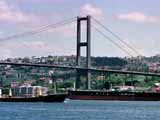Today.Az » World news » Turkey to take new steps to reduce tanker traffic through straits
09 February 2010 [13:12] - Today.Az
 In an effort to protect its world-famous Bosphorus from growing tanker traffic, the government plans new steps to reduce the use of Turkish straits by persuading oil transportation companies to use the Samsun-Ceyhan oil pipeline.
In an effort to protect its world-famous Bosphorus from growing tanker traffic, the government plans new steps to reduce the use of Turkish straits by persuading oil transportation companies to use the Samsun-Ceyhan oil pipeline.
The Foreign Ministry will contact the companies that transport oil via Turkish straits and ask them to “voluntarily” use the bypass pipeline, whose construction is nearing completion, deputy undersecretary Hakkı Akil said.
“The tanker traffic on the Bosphorus becomes more dangerous day by day,” Akil told daily Referans, adding that the ministry is planning to find a formula that will encourage companies to use the pipeline instead.
The Samsun-Ceyhan oil pipeline is being built by an international consortium led by Italy’s ENI and Turkey’s Çalık Group. A Russian company is also being considered to join the consortium in the future. The pipeline, with a capacity of 1.5 million barrels of oil per day, is designed to bypass Turkish straits.
Construction costs on the 550-kilometer-long pipeline are expected to be around $2 billion.
Since the early ’90s, Turkey has been engaged in an intense diplomatic struggle against Russia, the world’s most important oil and natural-gas exporter, over the use of the Turkish straits. Following some major tanker accidents in the straits that caused serious concerns among the 12 million residents of Istanbul, the Turkish government introduced a new set of measures to regulate tanker passages.
Russia has strongly rebuffed Turkey’s move, arguing that the country cannot block the free-passage right of civilian vessels through the straits under the 1936 Montreux Treaty.
“You can never explain to the residents of Istanbul the Montreux Treaty of free passage when events like the explosion of the Romanian tanker Independente occur. It would lead to a global crisis if the straits close,” Akil said, referring to the accident that took place in 1979.
“Nobody should count on the Turkish straits because someday a tanker accident will happen,” the diplomat added. “There is no such thing as zero risk.”
Highlighting the economic dimension of transferring the oil through the Samsun-Ceyhan pipeline, Akil said that the “transportation of oil in a most secure way is always more economic.”
“With the price being $75 to $80 a barrel, the $1 to $1.5 of security margin over the bypass line is nothing to the companies,” he added.
/Hurriyet Daily News/
|
|